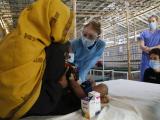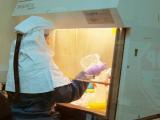Aug 4, 2010 (CIDRAP News) – Mail carriers in Minneapolis and St. Paul are prepared to deliver antibiotics to some of the population in the event of an anthrax attack, putting the Twin Cities at the forefront of a program to use the US Postal Service (USPS) to help blunt bioterrorist assaults, according to federal and state officials.
The program has been in the works for several years. A US Department of Health and Human Services (HHS) official said today that the Twin Cities are the furthest along of five large cities that are planning to use the strategy. HHS hopes that five to 10 cities will get involved in the next 2 years.
Peter Nowacki, USPS spokesman in Minneapolis, said about 400 postal employees have volunteered and been trained for the program, in the first of four recruiting phases that will eventually cover the whole USPS Twin Cities workforce.
He said the mail carriers would be ready to deliver antibiotics to households if an attack occurred today. The volunteers have been fitted with respiratory protection and given a supply of an antibiotics to protect themselves.
"For the areas that we have recruited people, yes, we're ready to go," he said. "But it's not the entire 551 and 554 zip [code] area, as it will be at some point. We'd have to communicate which zips would be covered. People in other zip codes would be directed to mass-dispensing sites."
Zip codes starting with 551 and 554 cover Minneapolis and St. Paul.
Nowacki said he wasn't sure what percentage of the population could actually be served by the program at this point. A USA Today report earlier this week said it could reach about a quarter of the area's residents, but Nowacki said the source of that estimate was unclear.
Aggie Leitheiser, emergency preparedness director for the Minnesota Department of Health (MDH) in St. Paul, agreed that Twin Cities mail carriers who have been trained could respond in the event of an attack.
"We believe this is an important strategy and an important tool, and we think we have a lot of the pieces in place if we needed to do it," she said.
Ann Knebel, deputy director for preparedness planning in the HHS Office of the Assistant Secretary for Preparedness and Response, said Seattle, Philadelphia, Boston, and Louisville are also working on plans to have mail carriers deliver drugs to blunt a biological attack. Tests of the idea were conducted in Seattle, Boston, and Philadelphia in 2006 and 2007, according to previous reports.
The effort is focused primarily on anthrax, given the letter attacks of 2001, but it could be used to counter other pathogens as well, Knebel said.
"Lousiville has had initial planning meetings with USPS officials and state health officials, so that's an active planning process," she said. "Boston is gearing back up, and I think they'd be next after Louisville. And we'll be contacting Philadelphia and Seattle to re-engage them, but that's still on the horizon."
The pace of the planning is being driven mainly by the cities, Knebel said. "Some are saying the postal option is not going to work for them. . . . If that'll work for them, we can help them with the planning. We've set as a target between five and 10 municipalities over the course of the next 2 years."
Knebel added that all the cities involved in the Cities Readiness Initiative are planning to dispense medical countermeasures at designated sites, or points of dispensing. "Many of them intend to use these points of dispensing as their main approach to delivering antibiotics," she said, adding that the federal government supports both the mail-carrier and point-of-dispensing approaches.
A presidential order last December called on the federal government to develop a USPS model that could be used in cities around the country, according to previous reports.
"[The] Minneapolis-St. Paul [approach] is the model plan that has been developed," Knebel said. "It would be adapted as other cities come on board, but it provides the general framework that others will build off of."
Twin Cities officials "had done an analysis and come to the conclusion that using solely a point-of-dispensing model wasn't going to meet the needs of the local population," she added. "So they started a planning process and were able to demonstrate that they had the ability and resources and the buy-in."
Leitheiser and Nowacki said the Twin Cities project has involved much groundwork.
Leitheiser said an agreement with the USPS was signed back in 2004, and the first requirement was to line up local law enforcement to protect mail carriers when delivering the antibiotics. "We started working on that really hard in 2007, and kind of had that in place a while ago," she said.
Nowacki said plans call for assigning an officer to protect each mail carrier, given the concern that people might try to steal the medications.
Recruiting postal workers was the next major step. Nowacki said the 400 volunteers recruited so far represent about 60% of those who were invited to participate. In addition to letter carriers, they include supervisors and members of the district emergency management team, he explained.
The volunteers were screened by the Medical Reserve Corps for any health concerns, particularly any contraindication to taking doxycycline, the prophylactic antibiotic the carriers would take to protect them from possible exposures while delivering drugs after an attack, Leitheiser and Nowacki said. The antibiotic is also being provided for the carriers' families.
The carriers also were fit-tested for N-95 respirators to protect them from airborne pathogens, Leitheiser said. That job was handled by USPS occupational health specialists.
Leitheiser said the USPS has had to consider many other details, such as the weight of the pill bottles to be used and what languages to provide instructions in.
"We were so impressed with the willingness and the response that we saw from the postal workers" she said. "I think the Postal Service has a special connection to anthrax, given the attacks in 2001. It was also very clear that they were connected to their communities. They wanted to know if they would be walking their usual routes. They know the people they deliver the mail to."
The USPS has not yet conducted an actual test of the drug delivery plan in the Twin Cities. MDH spokesman Buddy Ferguson said a "tabletop discussion" was held in Washington, DC, in May, but no operational exercise has been carried out.
"I think there's hope that we'll do something next year" in the way of a test run, said Nowacki.
Knebel said the safety of the mail carriers is an important concern. "One thing that people sometimes don't appreciate is the postal workers will be taking risks going out to do this. . . . If we can't guarantee the safety of the postal workers through PPE [personal protective equipment], antibiotics, and the security, it's basically a non-starter."
See also:
Oct 2, 2008, CIDRAP News story "To blunt anthrax attack, mail carriers to get antibiotics"



















